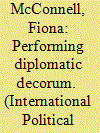|
|
|
Sort Order |
|
|
|
Items / Page
|
|
|
|
|
|
|
| Srl | Item |
| 1 |
ID:
189385


|
|
|
|
|
| Summary/Abstract |
This paper maps out contemporary discourses of Chinese diplomacy that have proliferated under the aegis of ‘major country diplomacy with Chinese characteristics’. We examine how these narratives are underpinned by webs of relationality that see China promoting equal and win–win partnerships with other state actors, yet are also defined by hierarchical premises for such diplomatic engagements. These relational contradictions are most clearly manifested when we interrogate the spatial dynamics of China’s diplomatic endeavours through the Belt and Road Initiative (BRI). By scrutinising the geopolitical imaginations, sites and scales associated with the BRI, we turn attention to three spatial tensions that are closely bounded up with the relational contradictions of Chinese diplomacy: ‘win–win’ diplomacy promoting a ‘harmonious world’ versus territorially based diplomacy; periphery diplomacy versus the global ambitions of BRI; and the centralisation versus decentralisation dimensions of Chinese diplomacy. This allows us to make sense of the multiplicity of descriptors that have been affixed to Chinese diplomacy, in order to underscore the ‘work’ they perform to bequeath (at times, divergent and contested) meanings to China’s new foreign policy approach. Hence, a relational and spatial understanding of Chinese diplomacy, we argue, can reveal a more nuanced picture of the promises, potential and disjunctures of China’s rapidly expanding geopolitical and diplomatic actions on the international stage.
|
|
|
|
|
|
|
|
|
|
|
|
|
|
|
|
| 2 |
ID:
163715


|
|
|
|
|
| Summary/Abstract |
This paper interrogates the notion of diplomatic decorum in order to shine new light on the power relations that underpin performance, rhetoric, and emotional labor in international politics. In framing decorum in terms of Aristotelian rhetoric and dramaturgical principles, the paper focuses on representatives of minority communities, indigenous peoples, and stateless nations for whom adopting social behavior appropriate for the spaces of international diplomacy takes on a heightened importance. Drawing on postcolonial critiques of diplomacy, attention turns to two distinct political repertoires and configurations of style and subject that these liminal geopolitical actors engage with. First the paper examines the extent to which “unofficial” diplomats perform behavior fitting to a particular diplomatic space and how they seek to enact a diplomatic style that will be deemed appropriate to their subject position as both outsiders and aspirant diplomats. Second, the paper examines what it means to break the unwritten rules of diplomatic decorum, both in terms of incidences where individuals push the boundaries deliberately in order to perform otherness, and in examples where diplomatic performances go awry. The paper concludes by considering the ways in which decorum is a productive lens through which to view and reassess the colonial norms and power relations underpinning diplomacy.
|
|
|
|
|
|
|
|
|
|
|
|
|
|
|
|
| 3 |
ID:
107225


|
|
|
|
|
| Publication |
2011.
|
| Summary/Abstract |
Exiled Tibetans in India are an unusual marginalised community. With their own government structure operating within the sovereign state of India, albeit without legal recognition, they are both de facto refugees from the perspective of the Indian state and Tibetan 'citizens' in the eyes of the Tibetan government-in-exile (TGiE). Based on ethnographic fieldwork, this paper examines the complex, dynamic and at times contradictory three-way relationship between this population and the two 'governments' which strive to identify, document and rehabilitate them. After sketching out the context of relations between India and (exile) Tibet, these interactions are explored through two key sets of state-population relations: the identification of individuals as citizens and refugees, and the provision of welfare. Interweaving 'top-down' and 'bottom-up' perspectives on such state-citizen and state-state relations, this paper juxtaposes the rhetoric of both 'governments' with Tibetan citizens' micro-political interactions with these state structures and foregrounds the importance of scale for analyses of the state. The paper concludes by reflecting on how this case can offer a critical spotlight on broader understandings of the everyday state. It is argued that this case provides particularly valuable leverage in demonstrating the partial and processual nature of statehood and powerfully exposes the contingent practices which underlie the social construction of political power in so-called 'normal' states.
|
|
|
|
|
|
|
|
|
|
|
|
|
|
|
|
|
|
|
|
|